History Report: Adam Smith, Industrial Revolution, Capitalism Impact
VerifiedAdded on 2022/08/26
|7
|1415
|20
Report
AI Summary
This report provides an overview of Adam Smith's economic philosophy, including his key theories like the 'Wealth of Nations,' natural law, and the concept of 'Laissez Faire,' along with his views on production factors. It then explores the Industrial Revolution, detailing its origins in Great Britain and its impact on the modernization of cities and the rise of capitalism. The report also examines the disadvantages of the capitalist economic system during the 19th century, such as financial instability, the potential for monopolies, and a focus on profit over societal obligations. Finally, it discusses the benefits of the Industrial Revolution, highlighting advancements in technology, medicine, and job creation, which led to an increased standard of living and longer life expectancies. The report references several academic sources to support its analysis.
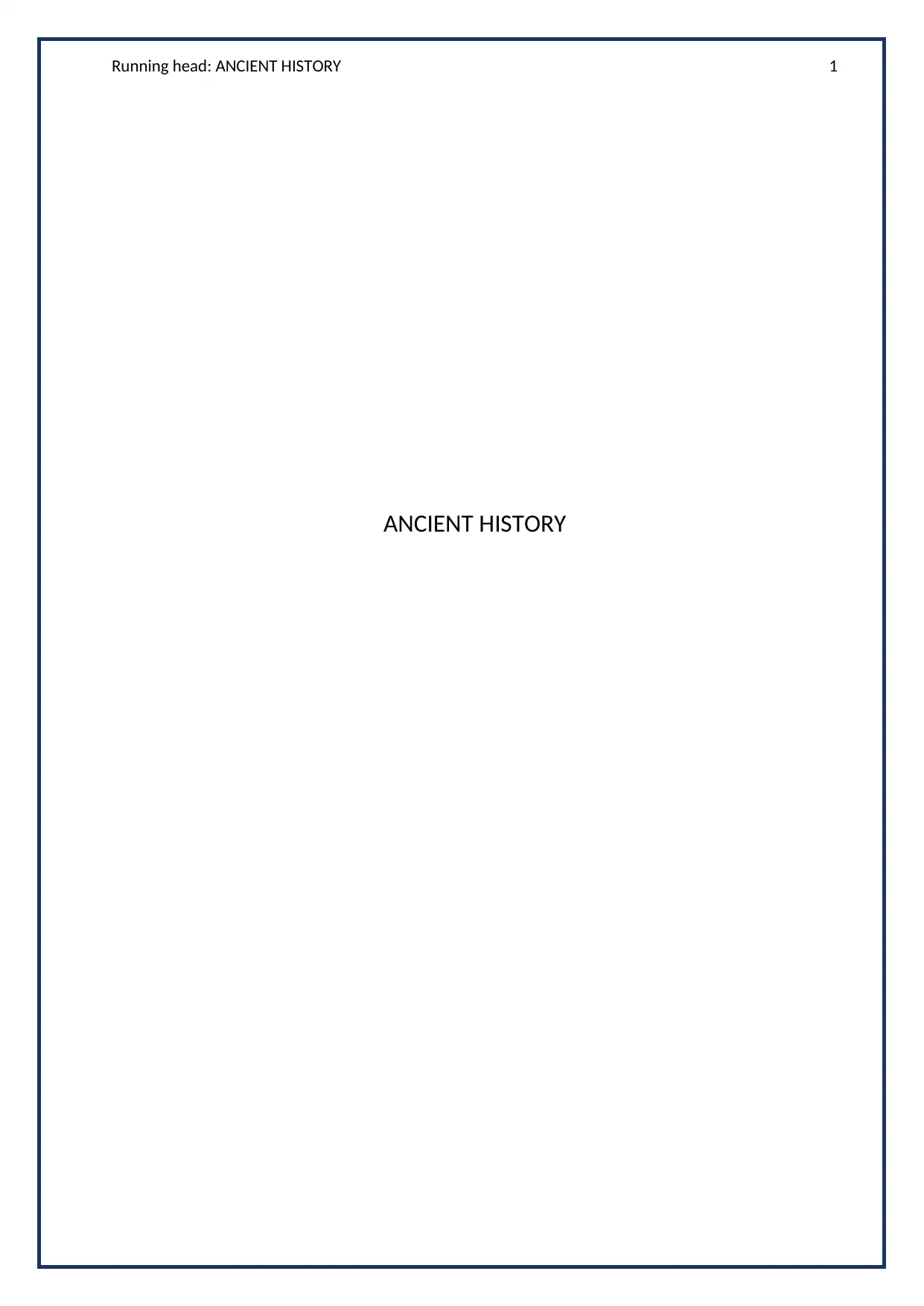
Running head: ANCIENT HISTORY 1
ANCIENT HISTORY
ANCIENT HISTORY
Paraphrase This Document
Need a fresh take? Get an instant paraphrase of this document with our AI Paraphraser
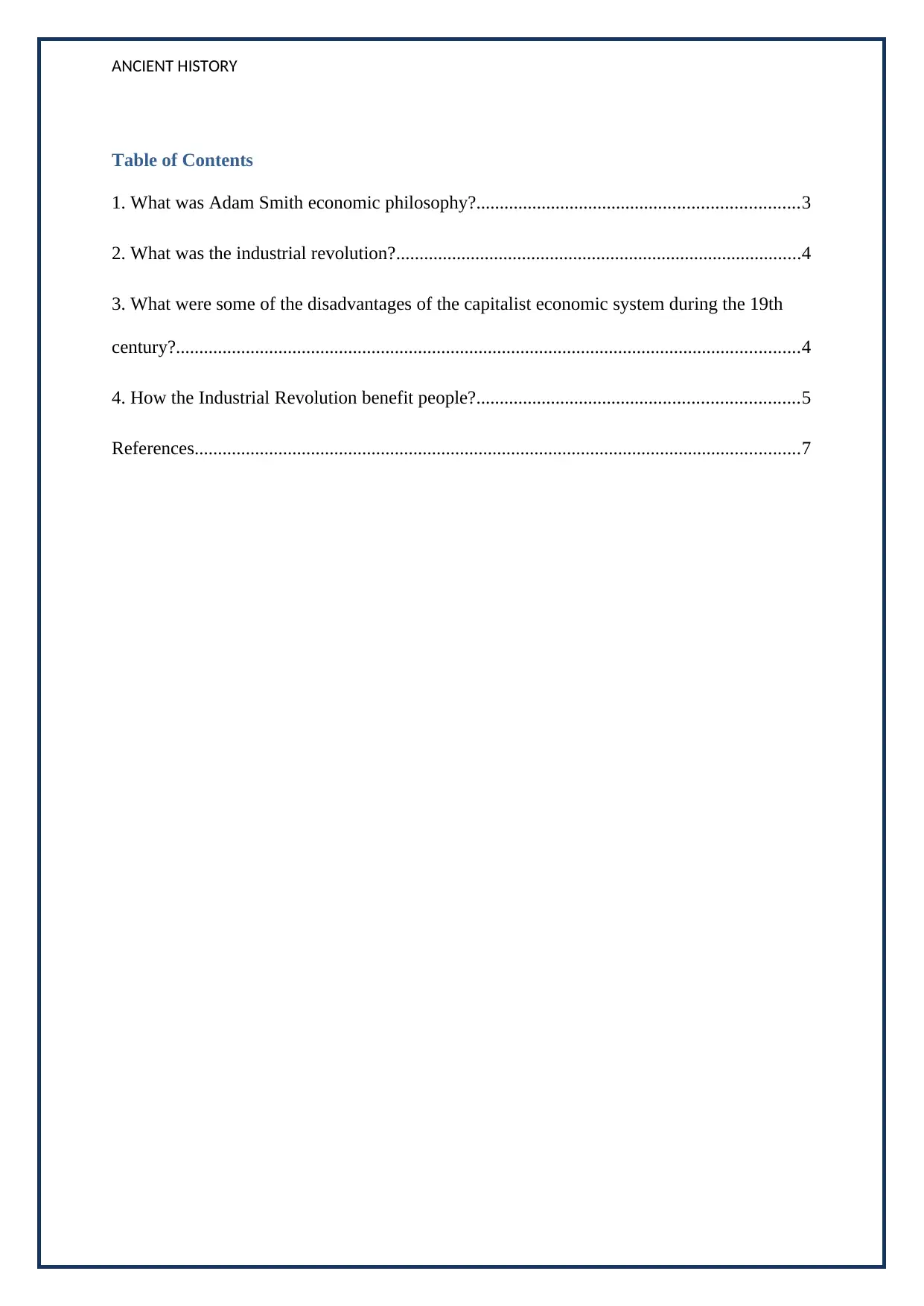
ANCIENT HISTORY
Table of Contents
1. What was Adam Smith economic philosophy?.....................................................................3
2. What was the industrial revolution?.......................................................................................4
3. What were some of the disadvantages of the capitalist economic system during the 19th
century?......................................................................................................................................4
4. How the Industrial Revolution benefit people?.....................................................................5
References..................................................................................................................................7
Table of Contents
1. What was Adam Smith economic philosophy?.....................................................................3
2. What was the industrial revolution?.......................................................................................4
3. What were some of the disadvantages of the capitalist economic system during the 19th
century?......................................................................................................................................4
4. How the Industrial Revolution benefit people?.....................................................................5
References..................................................................................................................................7
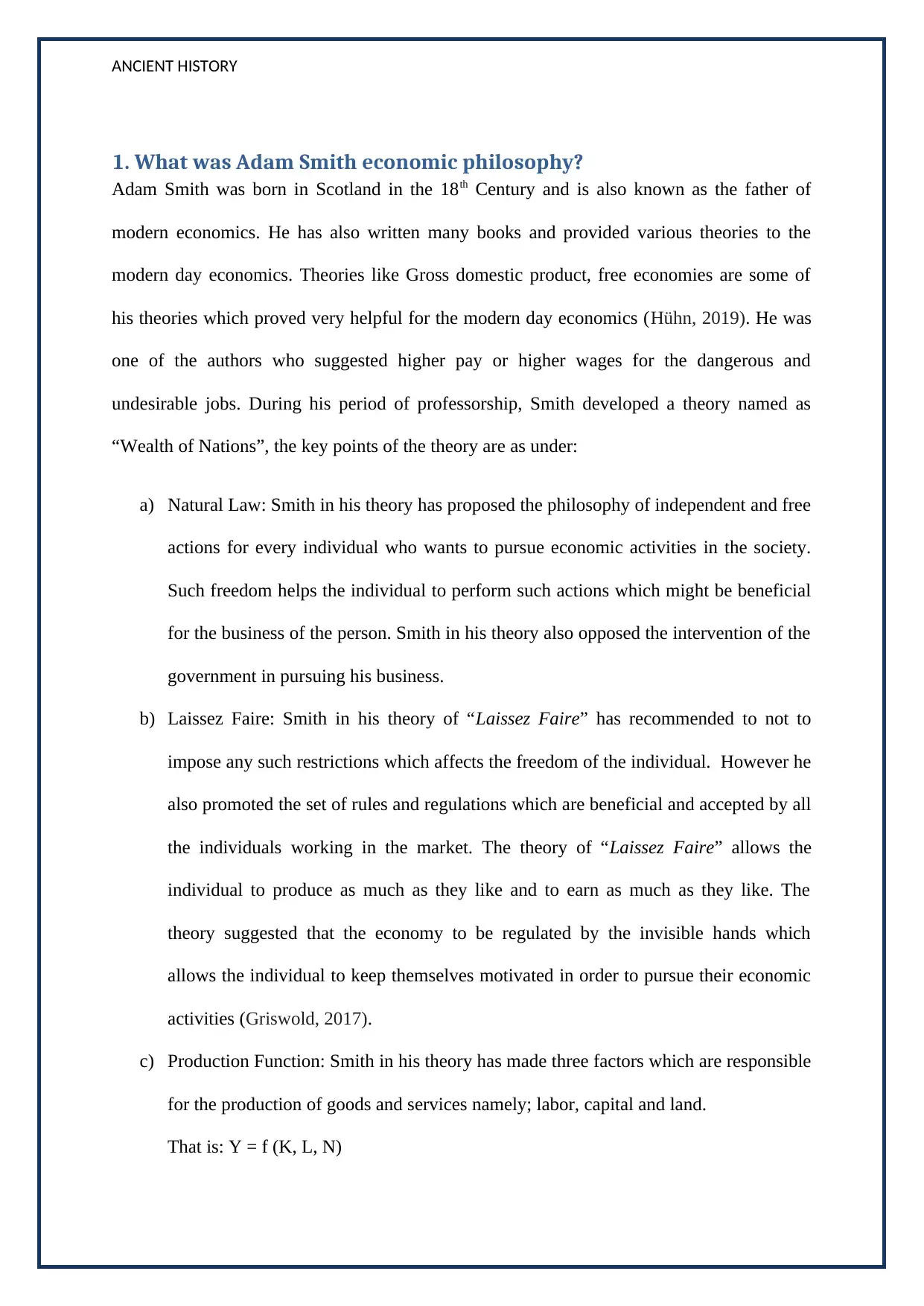
ANCIENT HISTORY
1. What was Adam Smith economic philosophy?
Adam Smith was born in Scotland in the 18th Century and is also known as the father of
modern economics. He has also written many books and provided various theories to the
modern day economics. Theories like Gross domestic product, free economies are some of
his theories which proved very helpful for the modern day economics (Hühn, 2019). He was
one of the authors who suggested higher pay or higher wages for the dangerous and
undesirable jobs. During his period of professorship, Smith developed a theory named as
“Wealth of Nations”, the key points of the theory are as under:
a) Natural Law: Smith in his theory has proposed the philosophy of independent and free
actions for every individual who wants to pursue economic activities in the society.
Such freedom helps the individual to perform such actions which might be beneficial
for the business of the person. Smith in his theory also opposed the intervention of the
government in pursuing his business.
b) Laissez Faire: Smith in his theory of “Laissez Faire” has recommended to not to
impose any such restrictions which affects the freedom of the individual. However he
also promoted the set of rules and regulations which are beneficial and accepted by all
the individuals working in the market. The theory of “Laissez Faire” allows the
individual to produce as much as they like and to earn as much as they like. The
theory suggested that the economy to be regulated by the invisible hands which
allows the individual to keep themselves motivated in order to pursue their economic
activities (Griswold, 2017).
c) Production Function: Smith in his theory has made three factors which are responsible
for the production of goods and services namely; labor, capital and land.
That is: Y = f (K, L, N)
1. What was Adam Smith economic philosophy?
Adam Smith was born in Scotland in the 18th Century and is also known as the father of
modern economics. He has also written many books and provided various theories to the
modern day economics. Theories like Gross domestic product, free economies are some of
his theories which proved very helpful for the modern day economics (Hühn, 2019). He was
one of the authors who suggested higher pay or higher wages for the dangerous and
undesirable jobs. During his period of professorship, Smith developed a theory named as
“Wealth of Nations”, the key points of the theory are as under:
a) Natural Law: Smith in his theory has proposed the philosophy of independent and free
actions for every individual who wants to pursue economic activities in the society.
Such freedom helps the individual to perform such actions which might be beneficial
for the business of the person. Smith in his theory also opposed the intervention of the
government in pursuing his business.
b) Laissez Faire: Smith in his theory of “Laissez Faire” has recommended to not to
impose any such restrictions which affects the freedom of the individual. However he
also promoted the set of rules and regulations which are beneficial and accepted by all
the individuals working in the market. The theory of “Laissez Faire” allows the
individual to produce as much as they like and to earn as much as they like. The
theory suggested that the economy to be regulated by the invisible hands which
allows the individual to keep themselves motivated in order to pursue their economic
activities (Griswold, 2017).
c) Production Function: Smith in his theory has made three factors which are responsible
for the production of goods and services namely; labor, capital and land.
That is: Y = f (K, L, N)
⊘ This is a preview!⊘
Do you want full access?
Subscribe today to unlock all pages.

Trusted by 1+ million students worldwide
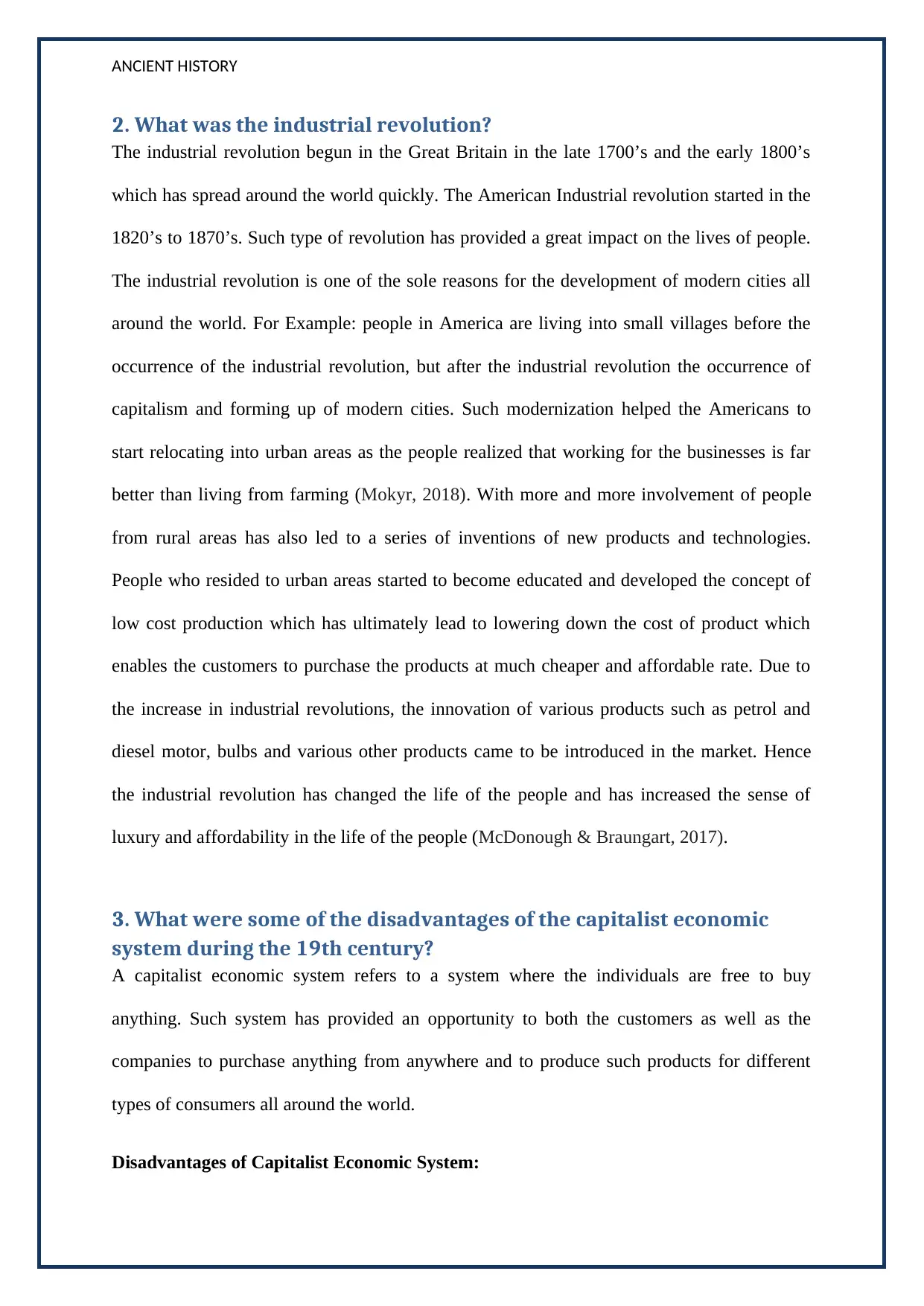
ANCIENT HISTORY
2. What was the industrial revolution?
The industrial revolution begun in the Great Britain in the late 1700’s and the early 1800’s
which has spread around the world quickly. The American Industrial revolution started in the
1820’s to 1870’s. Such type of revolution has provided a great impact on the lives of people.
The industrial revolution is one of the sole reasons for the development of modern cities all
around the world. For Example: people in America are living into small villages before the
occurrence of the industrial revolution, but after the industrial revolution the occurrence of
capitalism and forming up of modern cities. Such modernization helped the Americans to
start relocating into urban areas as the people realized that working for the businesses is far
better than living from farming (Mokyr, 2018). With more and more involvement of people
from rural areas has also led to a series of inventions of new products and technologies.
People who resided to urban areas started to become educated and developed the concept of
low cost production which has ultimately lead to lowering down the cost of product which
enables the customers to purchase the products at much cheaper and affordable rate. Due to
the increase in industrial revolutions, the innovation of various products such as petrol and
diesel motor, bulbs and various other products came to be introduced in the market. Hence
the industrial revolution has changed the life of the people and has increased the sense of
luxury and affordability in the life of the people (McDonough & Braungart, 2017).
3. What were some of the disadvantages of the capitalist economic
system during the 19th century?
A capitalist economic system refers to a system where the individuals are free to buy
anything. Such system has provided an opportunity to both the customers as well as the
companies to purchase anything from anywhere and to produce such products for different
types of consumers all around the world.
Disadvantages of Capitalist Economic System:
2. What was the industrial revolution?
The industrial revolution begun in the Great Britain in the late 1700’s and the early 1800’s
which has spread around the world quickly. The American Industrial revolution started in the
1820’s to 1870’s. Such type of revolution has provided a great impact on the lives of people.
The industrial revolution is one of the sole reasons for the development of modern cities all
around the world. For Example: people in America are living into small villages before the
occurrence of the industrial revolution, but after the industrial revolution the occurrence of
capitalism and forming up of modern cities. Such modernization helped the Americans to
start relocating into urban areas as the people realized that working for the businesses is far
better than living from farming (Mokyr, 2018). With more and more involvement of people
from rural areas has also led to a series of inventions of new products and technologies.
People who resided to urban areas started to become educated and developed the concept of
low cost production which has ultimately lead to lowering down the cost of product which
enables the customers to purchase the products at much cheaper and affordable rate. Due to
the increase in industrial revolutions, the innovation of various products such as petrol and
diesel motor, bulbs and various other products came to be introduced in the market. Hence
the industrial revolution has changed the life of the people and has increased the sense of
luxury and affordability in the life of the people (McDonough & Braungart, 2017).
3. What were some of the disadvantages of the capitalist economic
system during the 19th century?
A capitalist economic system refers to a system where the individuals are free to buy
anything. Such system has provided an opportunity to both the customers as well as the
companies to purchase anything from anywhere and to produce such products for different
types of consumers all around the world.
Disadvantages of Capitalist Economic System:
Paraphrase This Document
Need a fresh take? Get an instant paraphrase of this document with our AI Paraphraser
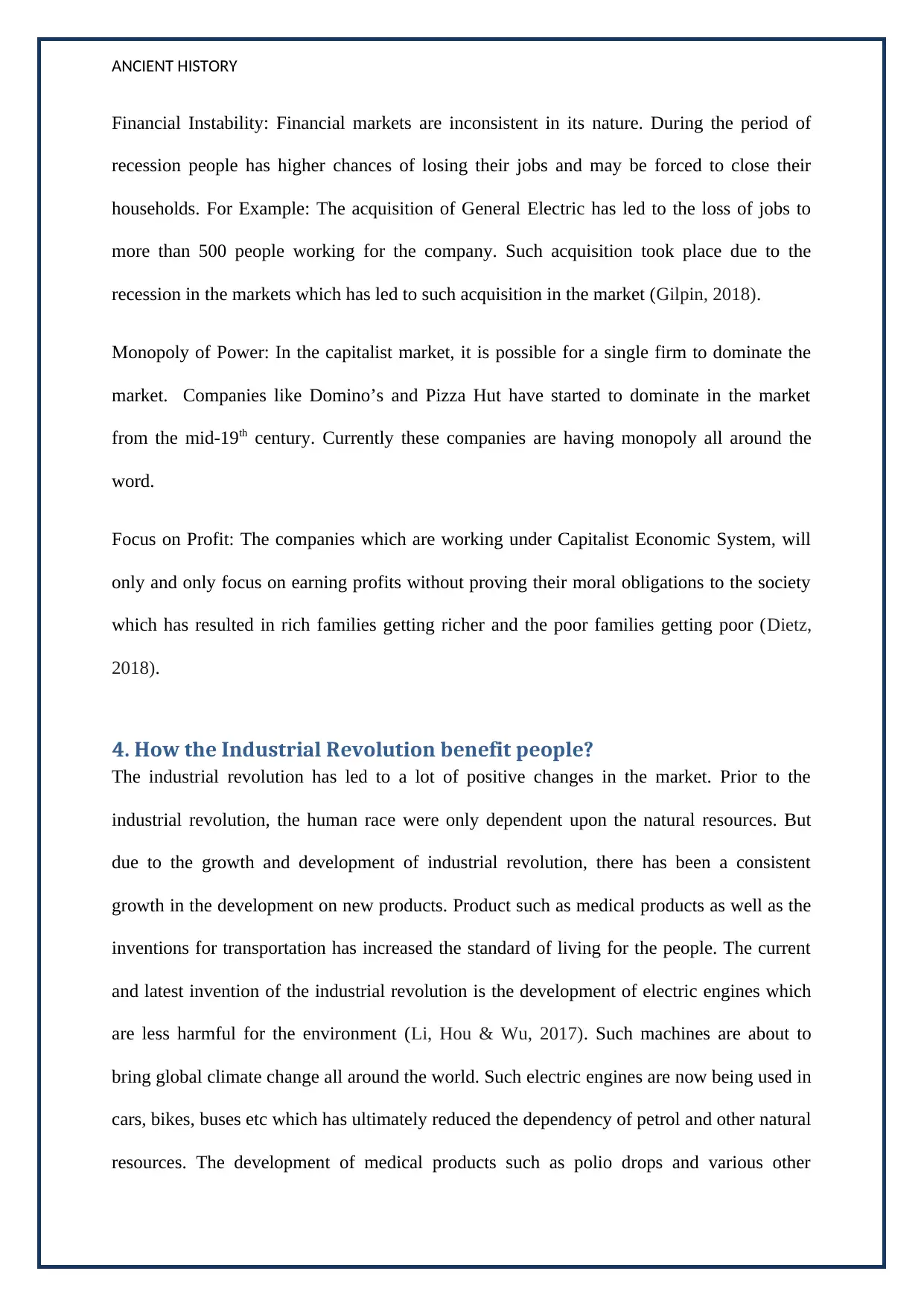
ANCIENT HISTORY
Financial Instability: Financial markets are inconsistent in its nature. During the period of
recession people has higher chances of losing their jobs and may be forced to close their
households. For Example: The acquisition of General Electric has led to the loss of jobs to
more than 500 people working for the company. Such acquisition took place due to the
recession in the markets which has led to such acquisition in the market (Gilpin, 2018).
Monopoly of Power: In the capitalist market, it is possible for a single firm to dominate the
market. Companies like Domino’s and Pizza Hut have started to dominate in the market
from the mid-19th century. Currently these companies are having monopoly all around the
word.
Focus on Profit: The companies which are working under Capitalist Economic System, will
only and only focus on earning profits without proving their moral obligations to the society
which has resulted in rich families getting richer and the poor families getting poor (Dietz,
2018).
4. How the Industrial Revolution benefit people?
The industrial revolution has led to a lot of positive changes in the market. Prior to the
industrial revolution, the human race were only dependent upon the natural resources. But
due to the growth and development of industrial revolution, there has been a consistent
growth in the development on new products. Product such as medical products as well as the
inventions for transportation has increased the standard of living for the people. The current
and latest invention of the industrial revolution is the development of electric engines which
are less harmful for the environment (Li, Hou & Wu, 2017). Such machines are about to
bring global climate change all around the world. Such electric engines are now being used in
cars, bikes, buses etc which has ultimately reduced the dependency of petrol and other natural
resources. The development of medical products such as polio drops and various other
Financial Instability: Financial markets are inconsistent in its nature. During the period of
recession people has higher chances of losing their jobs and may be forced to close their
households. For Example: The acquisition of General Electric has led to the loss of jobs to
more than 500 people working for the company. Such acquisition took place due to the
recession in the markets which has led to such acquisition in the market (Gilpin, 2018).
Monopoly of Power: In the capitalist market, it is possible for a single firm to dominate the
market. Companies like Domino’s and Pizza Hut have started to dominate in the market
from the mid-19th century. Currently these companies are having monopoly all around the
word.
Focus on Profit: The companies which are working under Capitalist Economic System, will
only and only focus on earning profits without proving their moral obligations to the society
which has resulted in rich families getting richer and the poor families getting poor (Dietz,
2018).
4. How the Industrial Revolution benefit people?
The industrial revolution has led to a lot of positive changes in the market. Prior to the
industrial revolution, the human race were only dependent upon the natural resources. But
due to the growth and development of industrial revolution, there has been a consistent
growth in the development on new products. Product such as medical products as well as the
inventions for transportation has increased the standard of living for the people. The current
and latest invention of the industrial revolution is the development of electric engines which
are less harmful for the environment (Li, Hou & Wu, 2017). Such machines are about to
bring global climate change all around the world. Such electric engines are now being used in
cars, bikes, buses etc which has ultimately reduced the dependency of petrol and other natural
resources. The development of medical products such as polio drops and various other
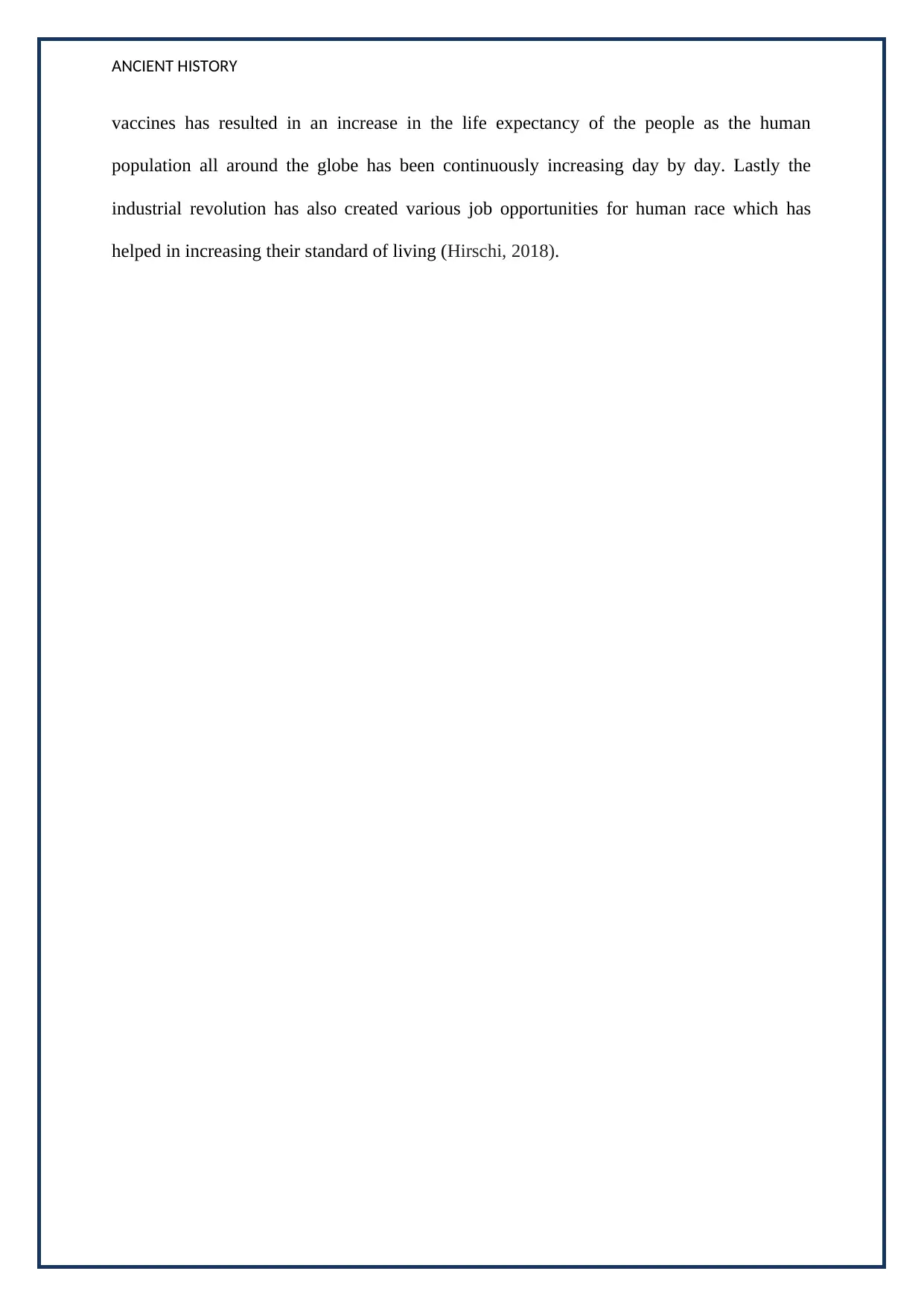
ANCIENT HISTORY
vaccines has resulted in an increase in the life expectancy of the people as the human
population all around the globe has been continuously increasing day by day. Lastly the
industrial revolution has also created various job opportunities for human race which has
helped in increasing their standard of living (Hirschi, 2018).
vaccines has resulted in an increase in the life expectancy of the people as the human
population all around the globe has been continuously increasing day by day. Lastly the
industrial revolution has also created various job opportunities for human race which has
helped in increasing their standard of living (Hirschi, 2018).
⊘ This is a preview!⊘
Do you want full access?
Subscribe today to unlock all pages.

Trusted by 1+ million students worldwide
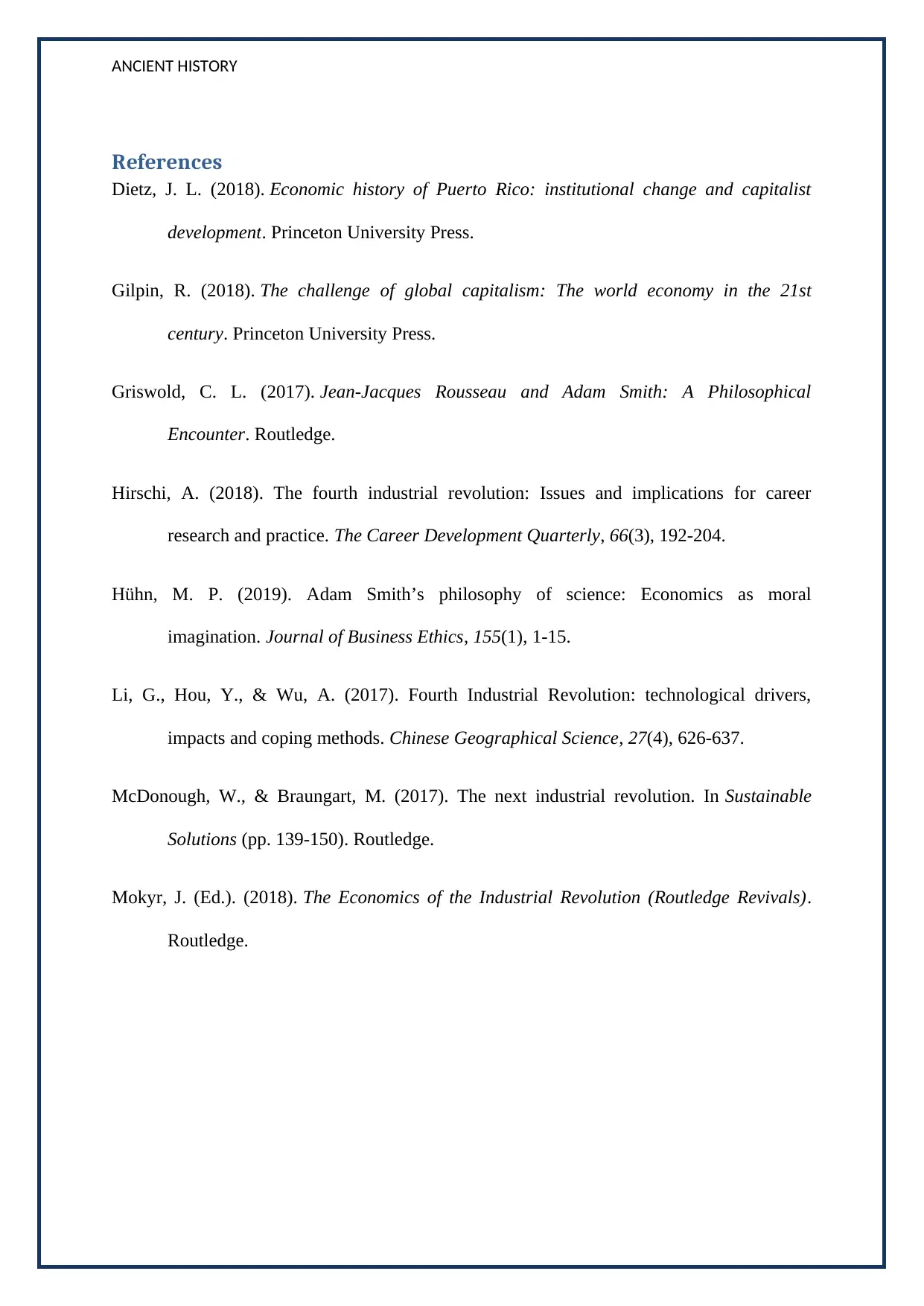
ANCIENT HISTORY
References
Dietz, J. L. (2018). Economic history of Puerto Rico: institutional change and capitalist
development. Princeton University Press.
Gilpin, R. (2018). The challenge of global capitalism: The world economy in the 21st
century. Princeton University Press.
Griswold, C. L. (2017). Jean-Jacques Rousseau and Adam Smith: A Philosophical
Encounter. Routledge.
Hirschi, A. (2018). The fourth industrial revolution: Issues and implications for career
research and practice. The Career Development Quarterly, 66(3), 192-204.
Hühn, M. P. (2019). Adam Smith’s philosophy of science: Economics as moral
imagination. Journal of Business Ethics, 155(1), 1-15.
Li, G., Hou, Y., & Wu, A. (2017). Fourth Industrial Revolution: technological drivers,
impacts and coping methods. Chinese Geographical Science, 27(4), 626-637.
McDonough, W., & Braungart, M. (2017). The next industrial revolution. In Sustainable
Solutions (pp. 139-150). Routledge.
Mokyr, J. (Ed.). (2018). The Economics of the Industrial Revolution (Routledge Revivals).
Routledge.
References
Dietz, J. L. (2018). Economic history of Puerto Rico: institutional change and capitalist
development. Princeton University Press.
Gilpin, R. (2018). The challenge of global capitalism: The world economy in the 21st
century. Princeton University Press.
Griswold, C. L. (2017). Jean-Jacques Rousseau and Adam Smith: A Philosophical
Encounter. Routledge.
Hirschi, A. (2018). The fourth industrial revolution: Issues and implications for career
research and practice. The Career Development Quarterly, 66(3), 192-204.
Hühn, M. P. (2019). Adam Smith’s philosophy of science: Economics as moral
imagination. Journal of Business Ethics, 155(1), 1-15.
Li, G., Hou, Y., & Wu, A. (2017). Fourth Industrial Revolution: technological drivers,
impacts and coping methods. Chinese Geographical Science, 27(4), 626-637.
McDonough, W., & Braungart, M. (2017). The next industrial revolution. In Sustainable
Solutions (pp. 139-150). Routledge.
Mokyr, J. (Ed.). (2018). The Economics of the Industrial Revolution (Routledge Revivals).
Routledge.
1 out of 7
Related Documents
Your All-in-One AI-Powered Toolkit for Academic Success.
+13062052269
info@desklib.com
Available 24*7 on WhatsApp / Email
![[object Object]](/_next/static/media/star-bottom.7253800d.svg)
Unlock your academic potential
Copyright © 2020–2025 A2Z Services. All Rights Reserved. Developed and managed by ZUCOL.




